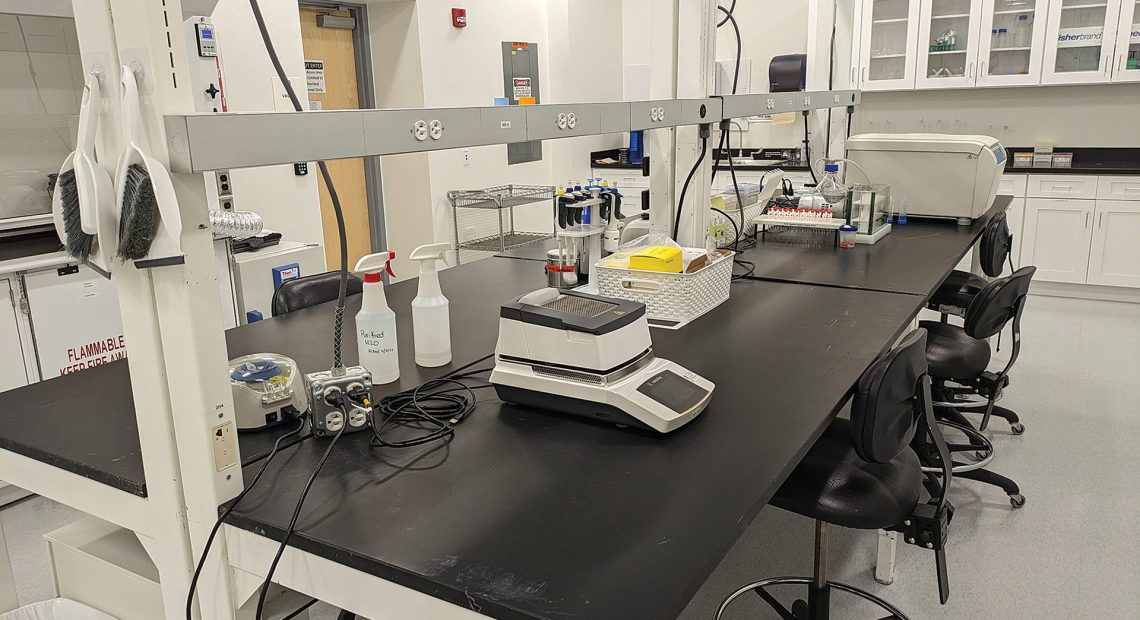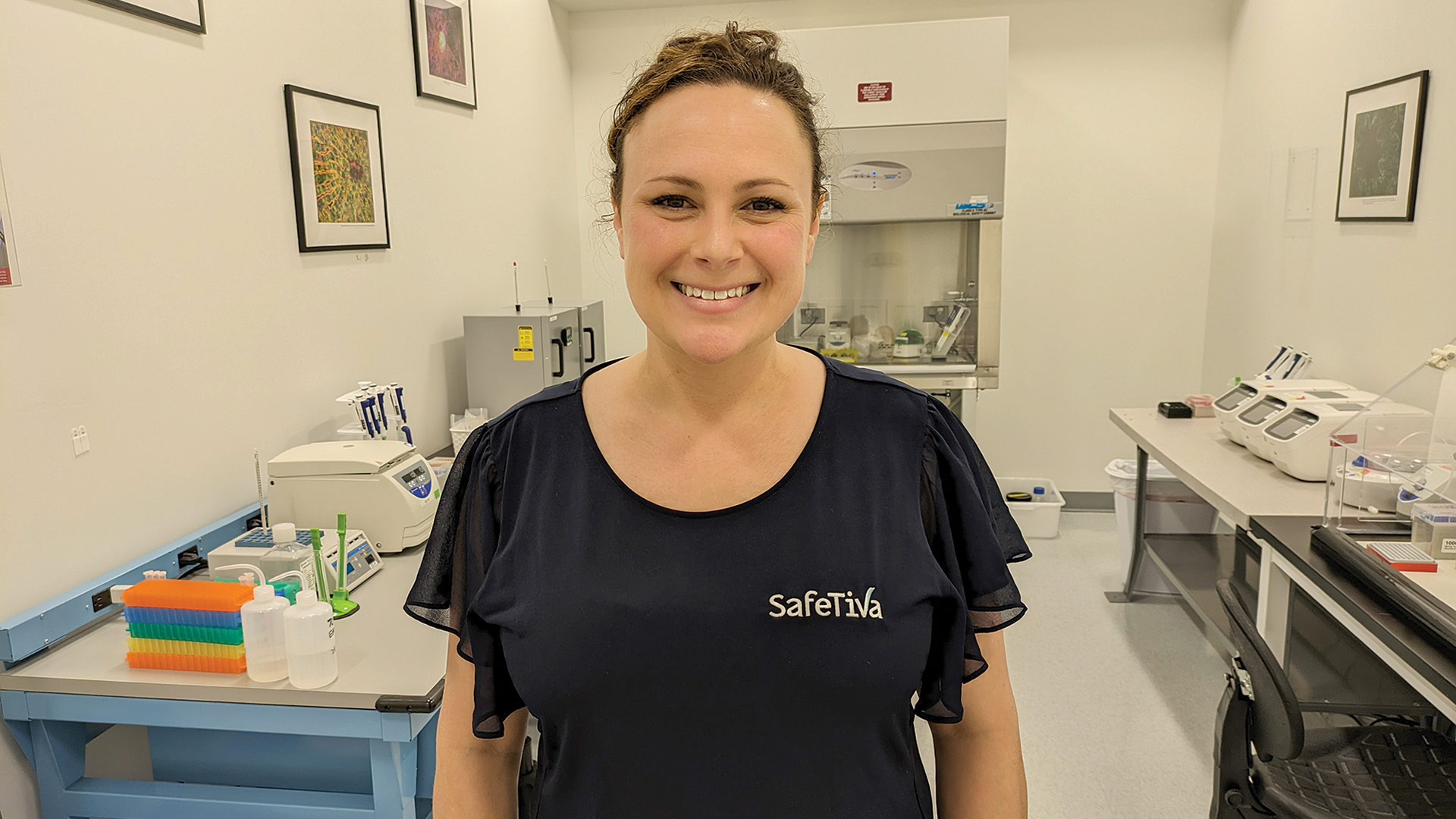
SafeTiva Labs Aims to Make Cannabis a Safer Industry
Testing, Testing

Megan Dobro turned a passion for cannabis testing, and a clear market opportunity, into a successful lab.
When Megan Dobro earned a degree in molecular biology from Caltech, she wasn’t thinking about a career in cannabis, which wasn’t even legal in Massachusetts back then.
But life has a way of posing challenges — and opportunities. Often in quick succession.
“I was on the faculty at Hampshire College. And then, shortly after getting tenure, they announced major financial trouble, and everyone scrambled and tried to figure out what to do,” Dobro recalled. “By then, the cannabis market was legal in Massachusetts, but there were only two labs, and that was the real bottleneck of the industry. So I started consulting for labs and then got really passionate about cannabis testing.”
So much that she took what she calls “a big leap of faith” to start her own company, SafeTiva Labs, in Westfield. She founded the enterprise in 2020 and opened last fall — an indication that the licensing process for cannabis testing moves as slowly as it does for dispensaries and cultivators.
“I just had a vision. There were no labs in Western Mass.,” she said. “But there were tons of big grow facilities because building square footage out here is cheaper than in Boston. Everyone was growing cannabis here and then having to drive it across the state to get it tested every week. So Western Mass. needed something. All of that, combined with my eagerness for a new career adventure, led to this.”
Dobro raised funds, purchased a former manufacturing facility, and converted it into a laboratory with not only cutting-edge equipment, but the safety and security measures required by the Cannabis Control Commission.
That was the challenge; the opportunity was the fact that labs weren’t proliferating around the state like dispensaries were, and she believed she could stand out in a limited field — and do the job more efficiently than existing labs, especially considering the proliferation of cannabis sales.
“The labs were really jammed, and it was taking eight weeks for licensed cultivators to get their results back. And in that eight weeks, they can’t do anything with their products. They don’t know the process. They can’t start packaging it. So it was really halting the industry,” she explained. “So I built this with turnaround time in mind. Everything was built for efficiency, for automation and advanced technology.”
By the time Dobro opened SafeTiva, there were more labs in the region, but she still aims for quick response, whether her client is a large grower, a manufacturer, or even a home grower, consumer, or concerned parent looking to test a small sample.
“Everyone was growing cannabis here and then having to drive it across the state to get it tested every week. So Western Mass. needed something.”
“Turnaround times across the state have come down, but they’re still longer than they need to be,” she said. “So that’s our big badge of honor and our point of differentiation: our turnaround time is under two days. And we’re pretty consistent about that.”
Great Chemistry
Testing is a necessary facet of the cannabis trade, Dobro said. “Every 15 pounds of flower or every batch of manufactured product has to go through a third-party, licensed testing lab,” she said. “We test for pesticides, solvents, the potency of the products, that it’s labeled accurately, and for contamination, heavy metals, and other safety requirements. It’s a required step in the process.”
To show how this is done, she gave BusinessWest a tour of the SafeTiva facility, starting with a traditional chemistry lab where team members extract the specific components being tested for. “There’s a pesticide method; there’s a solvent method. We test terpenes, which affect the flavor and smells of the cannabis. So everything has its own prescribed method that our lab team will conduct here in the sample lab.”
Across the hall is a small room where samples are tested for heavy metals, like lead, mercury, cadmium, and arsenic. “Metals will survive almost anything. They’re really hard to break down,” she said. “So the goal is to get everything else out of the sample so all that’s left are the metals. We digest it at really high heat.”
Up front, samples come in through the window and have to be logged with the state’s tracking system to make sure product isn’t being diverted anywhere. “Security is very tight with this,” she said.
After the tour, Dobro sat down to talk about other challenges in the cannabis-testing realm.
“There isn’t standardization across the labs because the regulations are really vague, so every lab is doing it differently. So results are different,” she explained. “And that leads to lab shopping, where growers can send their products to the lab they choose based on the results they like. That leads to lots of complaints about things not being labeled accurately, things passing that shouldn’t have passed.
“So, for us, we always emphasize honesty and ethics in what we do, and we make sure we’re telling all of our clients, ‘these are all the ways we do our quality checks and this is how our staff are trained,’ and we’re checking all the time to make sure things are accurate,” she went on. “But the state isn’t checking on that. So there’s a range of accuracy among the labs.”
Amid those inconsistencies across the industry, Dobro wants to be known as not only an accurate and ethical lab, but a valued partner to other businesses.
“We pride ourselves on delivering a really great service and giving our clients valuable data that informs their practices,” she explained. “So we hope that our clients don’t view us just as a necessary hurdle they have to jump through to get their product to market, but that we’re a valuable part of the process that provides data for them.”
“We hope that our clients don’t view us just as a necessary hurdle they have to jump through to get their product to market, but that we’re a valuable part of the process that provides data for them.”
Steven Lynch, director of Sales and Marketing at SafeTiva, agreed. “One of our goals is to take a transactional element out of the testing process,” he said. “In the time I’ve been with the lab, I don’t want to say we’re looked at in an adversarial fashion, but I think we’re looked at as a positive resource, so they can learn how to do things better on their end from a cultivation standpoint.”
Meanwhile, testing labs feel the ongoing financial squeeze across the industry that has some dispensaries closing and others wondering if they’ll stay afloat as profits tumble (see story on page 18).
“We’re a required service, so what we do is very expensive. Between our equipment, our staff, and reagents, it’s really expensive to run a lab,” Dobro told BusinessWest. “But it’s very difficult for producers to pay for services like this when their margins are already so tight. But then, it’s necessary for consumer safety. And we don’t want to cut any corners on this end, because that’s when bad things happen.”
That said, while cannabis testing labs aren’t technically recognized as legal federally, they’re also not subject to the burdensome tax requirements of growers, manufacturers, and retailers.
“While we are plant touching, we’re not buying or selling cannabis,” she noted. “We’re in a gray area because we’re here for consumer safety. We’re a necessary part of the legal market. Without us, it’s the free for all that the black market was. So I think they want us to stay put; they don’t want to give us too much trouble.”
Confidence Boost
Dobro’s life is busy these days; she is also the owner of an event-rental and design company, the Borrowed Teacup, and is still an associate professor of Biology at Hampshire College.
But SafeTiva has occupied more of her time this past year, which has been an interesting one, to say the least, in a sector that is still rapidly evolving and, in some cases, may be starting to contract.
“I think this year is going to be very interesting. I’m hopeful that we’re going in the right direction, where the shakeout is going to benefit those who are really passionate about what they do, the local growers who make really great product and don’t cut corners. If that happens, then I think the products consumers see in dispensaries will be that much better. Those who had no business being in this industry in the first place will leave and not be here anymore.”
Despite the competition, she also senses a certain camaraderie and shared experience among Massachusetts’ cannabis pioneers. “All the time, we tour facilities and hear the passion these growers have for their product. That’s the excitement that I’m hoping sticks around for Massachusetts.”
The day of BusinessWest’s tour, Dobro was getting ready for a visit by members of the Cannabis Control Commission; she invited them for a tour because she believes in the importance of open dialogue between the commission and businesses of all kinds, including labs.
“We should all be on the same side,” she said. “We’re testing for public safety. So I’m hoping they’re listening to the labs, trying to standardize the labs, so consumers can ultimately have confidence in what’s on the label.”




